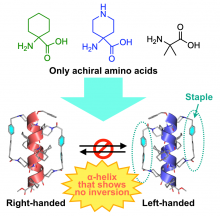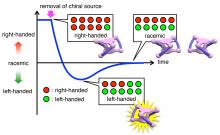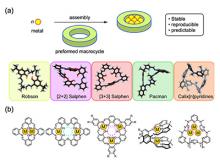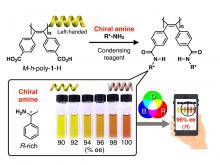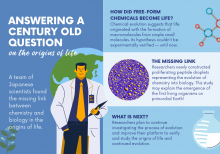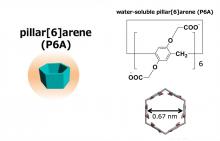Chemistry Supramolecular chemistry
News
17 Nov 2023
Researchers at Kanazawa University report in Nature Communications how they can control chirality inversion in α helical peptides.
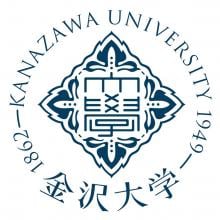
21 Feb 2023
Researchers at Kanazawa University report in Angewandte Chemie International Edition how the formation and deformation speed of interlocked molecular structures called rotaxanes can be tuned — a discovery that may lead to an enhanced functionality of rotaxanes as building blocks for molecular machines.
10 Mar 2022
Researchers at Kanazawa University report in Proceedings of the National Academy of Sciences a responsive molecular system that, through chemical reactions, inverses its chirality before becoming racemic.
05 Oct 2021
Researchers at Kanazawa University describe in Chemical Society Reviews how large cyclic molecules can be used for the synthesis of big metallic complexes with two or more metal atoms.
28 Sep 2021
Researchers at Kanazawa University report in Science Advances a new method for distinguishing between enantiomers, molecules that are mirror images of each other. The procedure, relevant for the pharmaceutical industry, involves the chemical reaction of target enantiomers with color indicator compounds consisting of one-handed helical polymers, leading to solutions showing different colors in specific solvents between the enantiomers.
27 Sep 2021
The missing link isn’t a not-yet-discovered fossil, after all. It’s a tiny, self-replicating globule called a coacervate droplet, developed by two researchers in Japan to represent the evolution of chemistry into biology.
12 Jan 2021
An atomic switch is bringing us closer to highly effective solid-state batteries for electric vehicles.
11 Jan 2021
Researchers at Kanazawa University report in Communications Chemistry that a molecule known as pillar[6]arene can form a host–guest compound with a cancer-associated metabolite. The phenomenon can be used to efficiently detect the metabolite in crude biological samples, which is important for preventing and treating metabolic syndrome and associated pathologies.
Events
Sorry, nothing coming up for this discipline
Researchers
Tony Z. Jia is a researcher at Japan’s Earth-Life Science Institute (ELSI), based at the Tokyo Institute of Technology. His research focuses on astrobiology, prebiotic chemistry, and origins of life.
Dr. Leung is an Associate Professor and Programme Director at the Department of Chemistry, The Hong Kong Baptist University (HKBU), Hong Kong SAR, P. R. China. He concurrently holds the Honorary Associate Professorship at the Faculty of Dentistry, The University of Hong Kong (HKU). He is a Chartered Scientist, Chartered Chemist of the Royal Society of Chemistry in UK and a member in the State Key Laboratory of Environmental and Biological Analysis at HKBU. He was elected as a Founding Member of The Hong Kong Young Academy of Sciences. His research interests are in the field of supramolecular chemistry, organic materials catalysis, nanoscience, and nanomedicine.
Giants in history
Sorry, nothing coming up for this discipline


